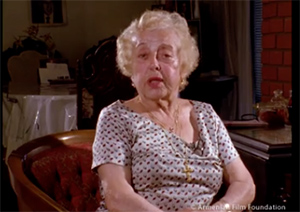
From the Armenian Genocide Collection: Rose Apelian
Rose Apelian was born in 1907 in New York to Armenian parents. Though both her parents had become American citizens since immigrating to the States, they decided to go back to their homeland in 1910 for property tax reasons.
Unfortunately, neither of her parents would ever return.
Apelian, her parents and her younger sister became victims of the Armenian Genocide. When Apelian was only 6, she and her family was forced to pack up their belongings and take a wagon throughout the country to Maskanah in Syria. On the day they left, neighbors, even Turkish policeman and soldiers, came to say goodbye to her father, who was well-respected for his American citizenship. Even that couldn’t save the family, though.
The family continued on the journey for 1-2 weeks. Each night they would stop, unpack their mattress and sleep outside, with the daughters hidden to protect them. Along the route they were robbed multiple times along the way -- sometimes they were even forced to stand in line and wait for Turks to take their belongings.
Even American citizenship couldn't save this family during the Armenian Genocide.
Once they reached their destination, her father was killed first after refusing to convert from Christianity to Islam three times. Her mother was violently thrown in a well and later died from her wounds.
Taking after her father, Apelian herself would not keep quiet about her faith. She began running away to try to find buildings with crosses on them to see if any would take her in if she told them she was Armenian, something her mother had suggested Apelian do before her death. Apelian then began drawing crosses all over the walls, angering the Turks.
Eventually, Apelian was sent to a poor people’s hospital where she encountered a girl who knew she was Armenian from the two tattoos she had on her forearms that she had gotten in Jerusalem. The girl told her to wait outside one night, and she was taken by a Turk to a house where she was cleaned, given new clothes, and soon taken to an orphanage in Istanbul, where she was relatively safe from the violence occurring in other parts of the country.
In 1992, Apelian gave her testimony to J. Michael Hagopian in Los Angeles. In a handful of brutally straightforward takes, she tells her story from start to finish, often repeating some of what she said in the last take at the beginning of the next one, serving to further emphasize the horrid details. Hagopian, rarely asks questions, letting Apelian simply give her narrative of what happened to her, ledning the interview a haunting flow. After she is done speaking, the camera zooms into and pans over the two tattoos that saved her, emphasizing their importance.